Results
-
 £67.32
£67.32From Whom All Blessings Flow
An impressive concert piece built around a very familiar hymn tune, this wonderful composition is certainly going to enhance Huckeby's already formidable reputation as a dynamic composer of the highest order. Excellent for concert, festival or contest performances, it even comes complete with an opt. choir part! Tremendous from start to finish!
Estimated dispatch 7-14 working days
-
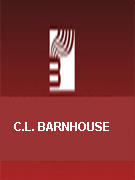 £89.10
£89.10Premiere Concertante (Concert Band - Score and Parts)
Based on the hymn tune "Holy, Holy, Holy." It is an inspirational piece to prepare and perform. Not technically difficult, it showcase a solo trio consisting of Flute, Clarinet and Alto Saxophone. This work will highlight any concert, especially those during holidays, and also makes an outstanding contest choice.
Estimated dispatch 7-14 working days
-
 £104.99
£104.99The Light of the World Wind Band Set (Score & Parts)
The Light of the World is an emotional and versatile piece based on the well-known hymn tune Aurelia. This arrangement by Dean Goffin will leave a deep impression on both musicians and listeners. 06:00
Estimated dispatch 7-14 working days
-
 £139.99
£139.99The Saint and the City Wind Band Set (Score & Parts)
This tumultuous composition tells the legend of the town of Zwolle in the Netherlands. In the waters surrounding Zwolle lived a dragon. When it appeared it threatened to destroy the town with it fiery breath if a human sacrifice was not offered. St Michael confronted the dragon in a battle without equal. As a knight armed with a double edged sword the archangel battled against the dragon and decapitated it. Thus the city was saved. To represent the archangel the composer has chosen the hymn tune Laudate Dominum . The dragon is symbolised by a series of menacing chords. 0:08:00
Estimated dispatch 7-14 working days
-
 £64.35
£64.35The Seventh Day
Based on the hymn tune "My Shepherd Shall Supply My Need", this fantasia is a musical reflection of the biblical account of The Creation. A powerful programmatic piece that opens with the woodwind choir and as the piece develops the mood shifts to excitement and a feeling of exhilaration. The tension and musical drama is brought to a conclusion only in the last measure as the climax is suspended for a long electric moment with the decay of a single chime tone. Without a doubt this is David Shaffer's most aggressive work to date. Highly Recommended.
Estimated dispatch 7-14 working days
-
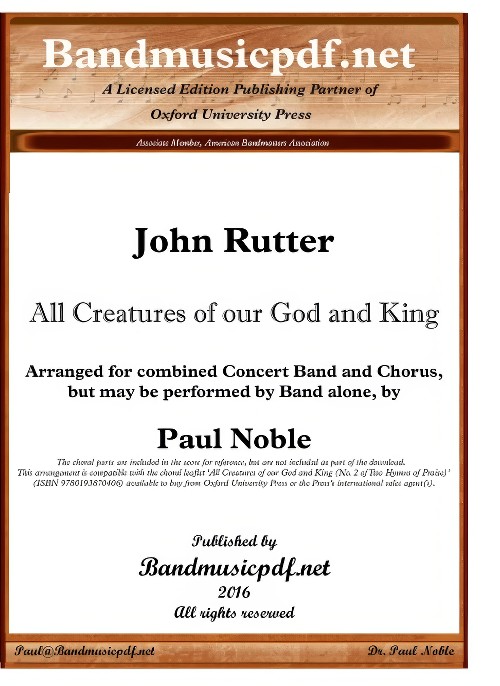 £110.00
£110.00All Creatures of our God and King (Concert Band with Optional Choir - Score and Parts) - Rutter, John - Noble, Paul
All Creatures of Our God and King is an English Christian Easter hymn by William Henry Draper, based on a poem by St. Francis of Assisi. It was first published in a hymn book in 1919. The words of the hymn were initially written by St. Francis of Assisi in 1225 in the Canticle of the Sun poem, which was based on Psalm 148. The words were translated into English by William Draper, who at the time was rector of a Church of England parish church at Adel near Leeds. Draper paraphrased the words of the Canticle and set them to music. It is not known when Draper first wrote the hymn but it was between 1899 and 1919. The hymn is currently used in 179 different hymn books. The words written by St Francis are some of the oldest used in hymns after Father We Praise Thee, written in 580 AD. Like Ye Watchers and Ye Holy Ones, Draper's text is usually set to the tune of Lasst uns erfreuen, a German Easter hymn published by Friedrich Spee in 1623 in his book Auserlesene Catholische Geistliche Kirchengesng. This tune became widespread in English hymn books starting with a 1906 arrangement by Ralph Vaughan Williams. John Rutter also wrote a piece of music for the hymn. Despite the hymn being initially written by Draper for Whitsun (the Anglican and English designation for Pentecost), it is mostly used in the ealier weeks of the Easter season. This setting by John Rutter begins with a rousing fanfare for trumpets and trombone, which segues in to the first verse of the hymn. There are seven verses included, but the director has the option of deleting verses as desired.
Estimated dispatch 7-14 working days
-
 £99.99
£99.99Veni Immanuel
The Advent hymn we all know today as O Come, O Come, Immanuel was arranged in its modern form by Thomas Helmore and published in Hymnal Noted in 1856. Both the words and melody, however, predate this version by centuries.The tune, Veni Immanuel, is taken from a 15th century processional of French Franciscan nuns, part of the setting for the funeral hymn Libera Me. This arrangement aims to expand on the power and mystery of the original tune and will be most effective if the solo trumpet at the start and end of the piece can be placed away from the band, maybe at the back of the auditorium.
Estimated dispatch 7-14 working days
-
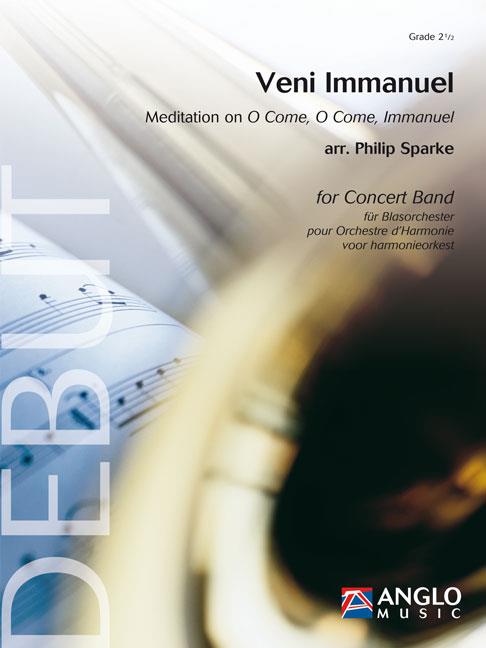 £99.99
£99.99Veni Immanuel (Concert Band - Score and Parts) - Sparke, Philip
Mediation on O Come, O Come ImmanuelThe Advent hymn we all know today as O Come, O Come, Immanuel was arranged in its modern form by Thomas Helmore and published in Hymnal Noted in 1856. Both the words and melody, however, predate this version by centuries.The tune, Veni Immanuel, is taken from a 15th century processional of French Franciscan nuns, part of the setting for the funeral hymn Libera Me. This arrangement aims to expand on the power and mystery of the original tune and will be most effective if the solo trumpet at the start and end of the piece can be placed away from the band, maybe at the back of the auditorium.Duration: 5:30
Estimated dispatch 7-14 working days
-
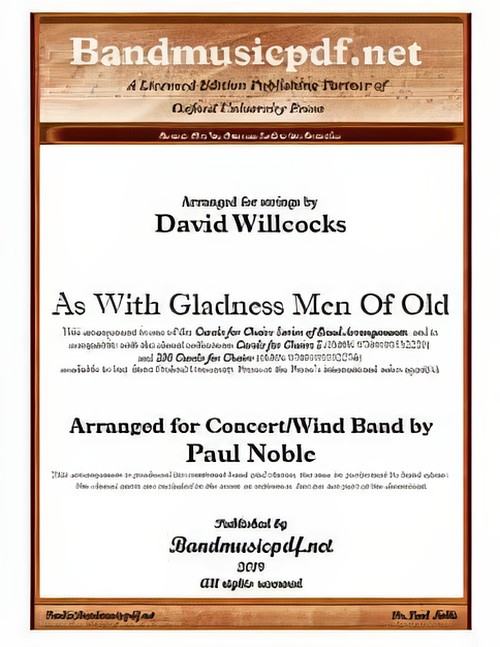 £75.00
£75.00As With Gladness Men of Old (Concert Band with Optional Choir - Score and Parts) - Noble & Willcocks
As with Gladness Men of Old is an Epiphany hymn, written by William Chatterton Dix on 6 January 1859 (Epiphany) while he was ill in bed. Though considered by many as a Christmas carol, it is found in the Epiphany section of many hymnals and still used by many churches. The music was adapted by William Henry Monk in 1861 from a tune written by Conrad Kocher in 1838. The hymn is based on the visit of the Biblical magi in the Nativity of Jesus. The hymn used Matthew 2:1-12 as a theme to compare the journey of the Biblical magi to visit the baby Jesus to each Christian's personal pilgrimage and as a reminder that it is not the value of the gifts, it is the value of giving and adoration to Jesus that is what Christians should seek. It is the only well-known Epiphany hymn or carol about the Biblical magi that avoids referring to them as either magi or kings and does not state how many there were. This arrangement represents one in the Series of Band Arrangements compatible with David Willcocks' Carols for Choirs.
Estimated dispatch 7-14 working days
-
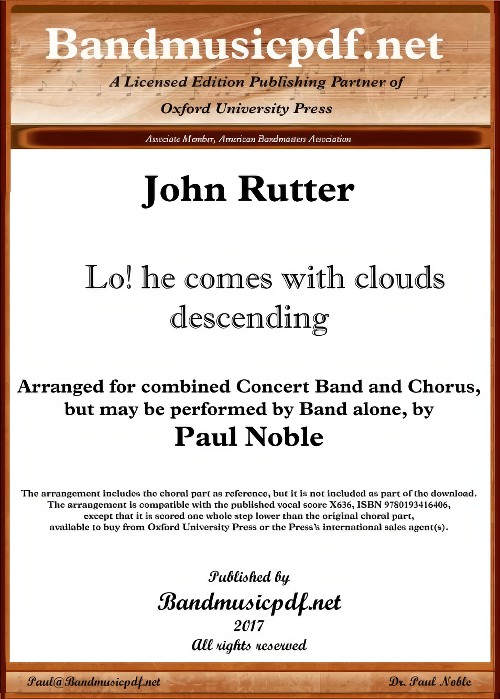 £75.00
£75.00Lo! He Comes with Clouds Descending (Concert Band with Optional Choir - Score and Parts) - Noble & Willcocks
Lo! He Comes with Clouds Descending is a hymn with a text by John Cennick (1718-1755) and Charles Wesley (1707-1788). Most commonly sung at Advent, the hymn derives its theological content from the Book of Revelation relating imagery of the Day of Judgment. Considered one of the Great Four Anglican Hymns in the 19th century, it is most commonly sung to the tune Helmsley, first published in 1763. This arrangement represents one in the Series of Band Arrangements compatible with David Willcocks' Carols for Choirs.
Estimated dispatch 7-14 working days
